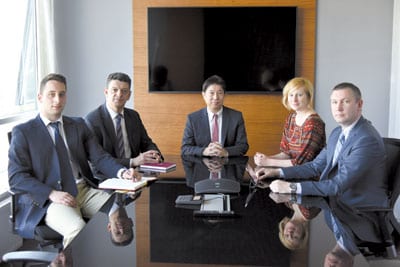The Strategy up to 2018 takes into account various environmental factors that are expected to have an impact on the Company, such as the world economic slowdown and geopolitical risks
With over 200 offices and subsidiaries in approximately 90 countries worldwide, and a network of over 600 group companies, Mitsubishi Corporation (MC) employs a multinational workforce of approximately 70,000 people. Its office in Belgrade was established 52 years ago, making it one of the company’s oldest offices in the world: the Belgrade Liaison Office now covers several countries in the region. Here Naoki Tsukada, General Manager, talks about the new management strategy up to 2018.
“Midterm Corporate Strategy 2018 – Evolving Our Business Model from Investing to Managing” sets forth MC’s corporate vision and management approach over the next three years, both of which are designed to generate sustainable business value. The strategy takes into account various environmental factors that are expected to have an impact on MC’s operations, including the world economic slowdown, changes in commodity markets, geopolitical risks, long-term stagnation of resource prices and changes caused by technological innovations such as AI and the IoT (the so-called “Fourth Industrial Revolution”).
Success in business today means vision. What is the vision of the Company in the future and what could employees expect?
 – MC is focusing on leveraging its ingenuity to create new business models and generate value for societies, thereby developing the highest level of management expertise.
– MC is focusing on leveraging its ingenuity to create new business models and generate value for societies, thereby developing the highest level of management expertise.
MC will also provide more opportunities for employees to develop into future leaders, instilling them with a strong sense of ethics, the foresight to anticipate and adapt to change, and the execution skills to overcome challenges in any business environment or era. More opportunities for employees to innovate new businesses will further enhance MC’s businesses, creating a virtuous cycle of professional and corporate growth.
The new strategy will focus more on proactively managing the businesses, enabling our management partners to benefit from MC’s unique strengths and functions
How will the management establish a balance between investment in resources and non-resources?
– In the resources sector, MC will focus its investments in metallurgical coal, copper and natural gas, optimising the quality of its portfolios while maintaining their overall sizes. In other areas of its business, MC will re-profile its portfolios but increase their sizes by investing in growing businesses where the company can proactively demonstrate its strengths.
The new strategy involves a new focus: “Further Evolution from Investing to Managing”. What does that mean?
– Over the strategy’s three-year period, MC will manage its investments and shareholder returns within its capacity to generate cash. Until now, MC has generated growth primarily by investing in businesses; however, the new strategy will focus more on proactively managing the businesses, enabling our management partners to benefit from MC’s unique strengths and functions, and generating continuous value together. Recognising that businesses have lifecycles influenced by environmental and other factors, MC will re-profile its portfolios by proactively demonstrating the company’s strengths.